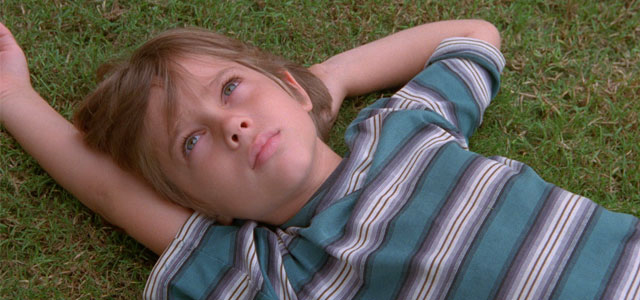(M) Ellar Coltrane, Patricia Arquette, Ethan Hawke, Lorelei Linklater
There has never been a film quite like Richard Linklater’s Boyhood. Wanting to make a coming of age film which truly captured the experience of childhood and adolescence, Linklater came up with a bold concept: he would cast a six year old boy, and over the next 12 years follow that character from the beginning of his school life to his leaving for college. While Michael Apted had done something similar with his Up series of documentaries, in which he has revisited the same subjects every seven years since 1964, no one had attempted to tell a fictional story in this fashion.
A unique concept required a unique approach. Shot in 39 days between 2002 and 2013, each year the cast and crew would gather together when their schedules permitted for three or four days of shooting. Rather than running from a set screenplay, they started with a basic structural blueprint, and then Linklater would write the film as they went, year by year, enabling it to grow organically as its cast did.
This approach to production meant that, in Linklater’s words, time became a collaborator on the film. Time brings with it change and uncertainty, not to mention risk. Changes in the young actors had to be taken into account as the screenplay evolved. Each year, Linklater would start the process by having a chat with his young lead, Ellar Coltrane, about where he was in his life, and that discussion would serve as inspiration for the character. Similarly, the world changed over the twelve years the film was in production, and the film navigates those cultural and political changes. So we see the Iraq War and the election of Barrack Obama, events which wouldn’t have been known at the commencement of the project, become a part of the story.
The result is a film which manages to be both epic in scope and incredibly intimate at the same time. With no strict narrative to speak of, Boyhood simply recounts an ordinary life. Mason’s family goes through their fair share of changes and trials, but these events are all presented devoid of any melodrama. Even without a central narrative thread to hook us in, the characters are so well formed that we care about what happens to them. Mason is a dreamer, a curious boy with a thoughtful, artistic temperament. We watch him shape himself into a young man, no doubt in opposition to the string of abusive, alpha-male types that his mother has coupled with since his parents’ divorce. The film is called Boyhood, so obviously is centred around Mason’s experience, but it has just as much to say about girlhood through his sister Samantha, and parenthood through the journeys of his mother and father.
Ultimately, the film works because there is something strangely fascinating about watching these characters actually grow up before your eyes. This ageing process is often subtle. Linklater opts not to telegraph the progress through time with captions letting us know when we have leapt forward a year, instead trusting his audience to work it out for themselves through the little details: changes in haircuts, music styles and personal electronic.
Incredibly ambitious and effectively executed, Boyhood is a unique and at times quite profound cinematic experience.
Duncan McLean












